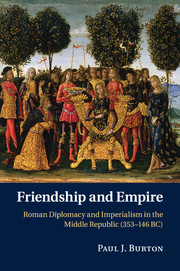Book contents
- Frontmatter
- Contents
- Preface
- Abbreviations
- Chapter 1 Discourse, International Relations, and International Relations theory
- Chapter 2 Friendship practices and processes
- Chapter 3 Amicitia incipit: beginning international friendship
- Chapter 4 The duties of international friendship
- Chapter 5 The breakdown and dissolution of international friendship
- Conclusion
- Bibliography
- Index
Chapter 2 - Friendship practices and processes
Published online by Cambridge University Press: 05 December 2011
- Frontmatter
- Contents
- Preface
- Abbreviations
- Chapter 1 Discourse, International Relations, and International Relations theory
- Chapter 2 Friendship practices and processes
- Chapter 3 Amicitia incipit: beginning international friendship
- Chapter 4 The duties of international friendship
- Chapter 5 The breakdown and dissolution of international friendship
- Conclusion
- Bibliography
- Index
Summary
Defining friendship: the processual approach
Human beings, as Aristotle famously defined them, are political (that is to say social) animals, and as such, practice some sort of friendship “in every community.” The ubiquity and varieties of friendship across time and across human populations perhaps explain the difficulty in defining precisely what the relationship is and entails. The following definition attempts to encompass the most commonly encountered descriptions of friendship in the relevant ancient and modern literature:
Friendship is a voluntary and achieved, informal and extra-institutional human relationship secured by bonds of personal trust and affection between partners, and is based on mutual similarity and complementarity of needs, temperament, and status.
Although definitions have the virtue of providing analytical focus for the study of complex human phenomena and the evidence for it, they are far too general and static to capture accurately the variety and multipli-city of human experience; a dynamic, multilayered, and multidimensional description is needed. The “practical logic” approach of Pierre Bourdieu points in this direction:
To restore practice to its practical truth, we must…reintroduce time into the theoretical representation of a practice which, being temporally structured, is intrinsically defined by its tempo.
- Type
- Chapter
- Information
- Friendship and EmpireRoman Diplomacy and Imperialism in the Middle Republic (353–146 BC), pp. 28 - 75Publisher: Cambridge University PressPrint publication year: 2011

